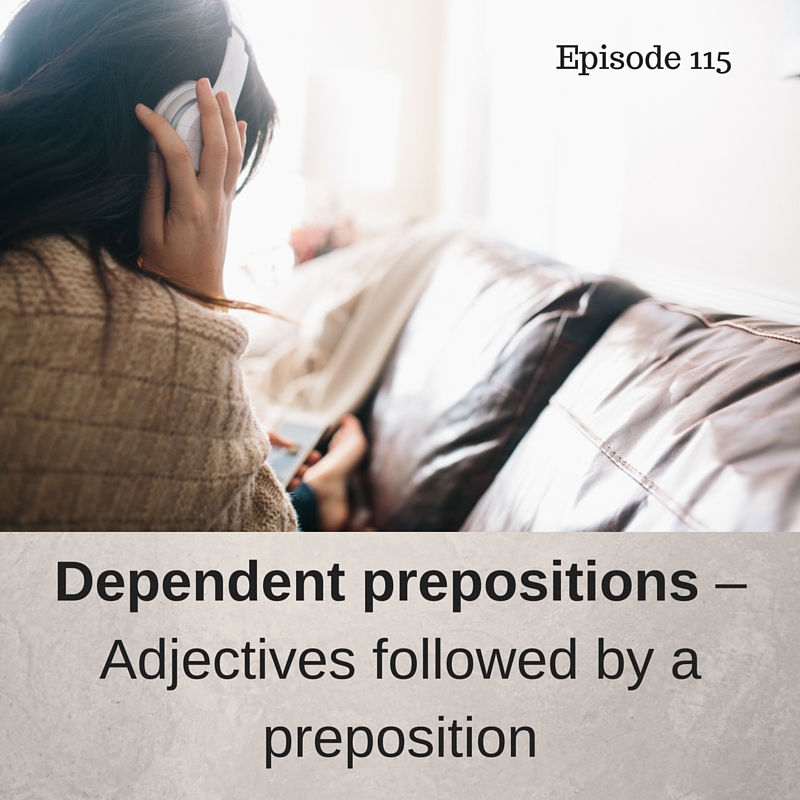
In this episode we’re going to help you revise and practise prepositions that are commonly found after some popular adjectives. 
Listener Feedback: Gaby from Peru
Gaby is an English teacher working with accountants: Episode 24 and Episode 46 – money verbs Episode 24 Money vocabulary and the economy:
What does she like?/What is she like? Episode 44 – ‘like’ and ‘as’
Episode 117 is going to be about describing trends
‘Thanks a bunch!’ – we love you too, Gaby! I think this YouTube video will help you with ‘like’:
A dependent preposition is a preposition that always follows the same expression;
for example, we say ‘interested in’ and not X ‘interested on‘ or ‘interested about‘ X.
AT
good/bad/fantastic/awful…. at – Craig’s bad at tennis. Reza’s awful at time keeping.
mad/angry at* – My girlfriend’s mad/angry at me for forgetting her birthday.
ABOUT
excited about – Is there anything you’re excited about?
sorry for/about – Is there anything you’re sorry for?
crazy/mad about – What food are you crazy about?
un/happy about – She wasn’t happy about her exam result
enthusiastic about – We’re enthusiastic about podcasting
IN
un/interested in – What are you interested in at the moment?
un/successful in – Steve Jobs was extremely successful in business.
deficient in – Peter’s poor diet is deficient in vitamins
OF
sick of / tired of – Craig’s getting a bit tired of Reza’s old jokes
proud of – What have you done in your life that you’re proud of?
afraid/frightened of – What are you afraid/frightened of?
typical of – It’s typical of him to cancel at the last minute
fond of (= keen on) – We’re rather fond of “dulce de leche”
guilty of – The suspect was found guilty of murder.
WITH
dis/pleased with – The headmaster was pleased with the new student’s progress.
dis/satisfied with – I am extremely dissatisfied with the poor service in this restaurant.
disgusted with – She was disgusted with her new friend’s bad table manners.
crowded with – Valencia is crowded with people during the busy Fallas festival.
content with – Reza’s pretty content with his new shoes.
Improve your speaking with an italki teacher
TO
(to be/get) used to – The EU may have to get used to the British no longer being a member soon. (Revise ‘used to’, ‘to get used to’ and ‘to be used to’ here
sensitive to – You should try to be sensitive to my spouse’s needs.
similar to – Bob writes in a similar way to me
FROM
different from – Canada’s climate is very different from Bolivia’s.
safe from – The refugees went far away to be safe from the war.
FOR
famous for – Scotland is famous for its beautiful highland scenery and whisky.
convenient for – The number 23 bus is very convenient for getting to the shopping centre.
ON
intent on – The terrorist was intent on causing destruction.
keen on (= fond of) – We’re rather keen on “dulce de leche”
Now it’s your turn to practise your English. Do you have a question for us or an idea for a future episode?
Send us a voice message and tell us what you think. www.speakpipe.com/inglespodcast
Send us an email with a comment or question to [email protected] or [email protected].
If you would like more detailed shownotes, go to https://www.patreon.com/inglespodcast
Our lovely sponsors are:
Lara Arlem
Zara Heath Picazo
Mamen
Juan Leyva Galera
Sara Jarabo
Corey Fineran from Ivy Envy Podcast
Jorge Jiménez
Raul Lopéz
Rafael
Daniel Contreras Aladro
Manuel Tarazona
On next week’s episode: Dependent prepositions – Nouns followed by a preposition
The music in this podcast is by Pitx. The track is called ‘See You Later’



Hello Craig and Reza!
Once again both of you are excellent cool teachers and I have passed a good time listening this podcast about dependent prepositions which are mostly very difficult for foreigners. I congratulate you on your awsome explanations.
Nevertheless as a Spaniard woman I can explain you some minor clarifications about two Spanish verbs:
1/ The meaning of the verb “aprobar” is not only to pass an exam but to accept opinions and the behaviour of other people, for instance:
– Mi padre no aprueba que yo vaya al concierto.
– No apruebo el engaño.
2/The other explanation is about the verb “pagar”; I can say: Yo pago las cervezas but I can use the preposition “por” when the meaning is about a punishment or in a threat “pagar por ello”, for example:
– Pagará por todo lo malo que ha hecho.
Déjalo que se vaya, ya pagará por lo que nos ha hecho.
I hope I have been helpful. I wish you a happy summer.
Cheers
Marian
Thanks for your clarifications on the Spanish verbs. Happy summer to you, too!
Hey guys, thanks for leetting me be part of this podcast and for all the suggestions given. it´s been way rewarding for me. I ve just watched this video about “like”, but still I have a question for you, well, “WHAT IS SB LIKE?” may also refer to not only personality but physical appearance right? so It is two questions for physical appearance: what is sb like? and what does sb look like?…thanks for your further information on this topic. I ll be back soon with more …bear hugs for both of you.
Hi Gabriela! Yes, there are two questions for physical appearance, but usually ‘What is somebody like?’ is most common for personality.
‘What does somebody look like’? is only for appearance.
Hope to hear form you again soon.
Hello again, I would like to know more about verb collocations if it is possible. For example, related to verbs make, get or have. thanks.
Hi Maria Jose,
Thanks for your suggestion. We will be speaking about common verb collocations in the September podcasts.
Thanks for give me ample information about independent adjective